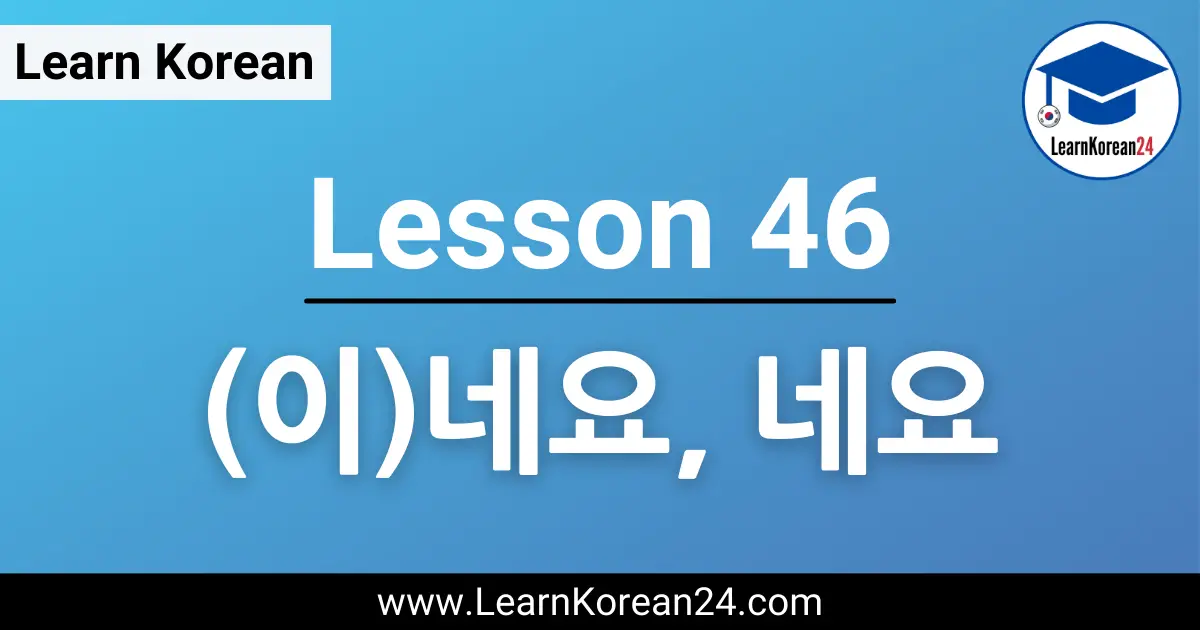Lesson 46: (이)네요, 네요
In this lesson, you will learn the ending (이)네요 and 네요, which are used to express feelings or surprise about some new information. (이)네요 and 네요 are similar to saying “Oh…” or “I see that…” in English. By the end of this lesson, you’ll be able to say things like, “Oh, there it is!“, “I see you’re really good at Korean.”, etc.
Lesson 46: (이)네요, 네요
The endings (이)네요 and 네요 are used to express feelings or surprise about some new information. The new information can be something the speaker found out from seeing, hearing, tasting, or smelling something. To help you understand what we mean, here are some examples:
머리를 잘랐네요. = I see that you got your hair cut.
벌써 여름이네요! = Wow, it’s already summer!
날씨가 덥네요. = Oh, the weather is hot.
Another useful function of the endings (이)네요 and 네요 is to show agreement with something a person said. For example:
이거 맛있지요? = This is delicious, isn’t it?
네, 맛있네요. = Yes, it is. (Yes, I see that it is delicious.)
(이)네요
(이)네요 is attached to nouns only and can be used without the polite ending 요 attached in casual, non-polite sentences. By attaching (이)네요 to nouns, it expresses “I see that it/he/she is…” or “Oh, it/he/she/ is…“.
| Conjugation Rule | Examples |
|---|---|
| Noun Ending In Consonant + 이네요 | 책 (book) → 책이네요 |
| Noun Ending In Vowel + 네요 | 노래 (song) → 노래네요 |
책 = book
이거 수민 씨의 책이네요! = Oh, this is Sumin’s book!
노래 = song
이거 BTS 노래네요! = Oh, this is BTS’s song!
3시= 3 o’clock
아직 3시네요! = Oh, it’s still 3 o’clock!
금요일 = Friday
벌써 금요일이네요! = Oh, it’s already Friday!
네요
네요 is attached to verbs and adjectives only. Again, you can remove the polite ending 요 in casual, non-polite sentences. Just like (이)네요, 네요 is used to show surprise or feelings about some new information. Unlike (이)네요, there are no special conjugation rules with 네요. Simply attach it to the first verb or adjective without a space (unless the verb/adjective is irregular – see table below).
| Conjugation Rule | Examples |
|---|---|
| Verb Stem Ends In Consonant / Vowel + 네요 | 가다 (to go) → 가네요 싸다 (to be cheap) → 싸네요 먹다 (to eat) → 먹네요 작다 (to be small) → 작네요 |
| <Irregular Conjugations> | 살다 (to live) → 사네요 열다 (to open) → 여네요 멀다 (to be far) → 머네요 힘들다 (to be hard) → 힘드네요 |
춥다 = to be cold
방이 춥네요. = Oh, the room is cold.
싸다 = to be cheap
옷이 싸네요. = Wow, the clothes are cheap.
읽다 = to read
책을 많이 읽네요. = I see that you read a lot of books.
운동하다 = to exercise / work out
요즘 매일 운동하네요. = I see that you exercise every day these days.
아/어/여요 VS 네요
Both 아/어/여요 and 네요 are used to make present tense sentences. However, there is an important difference between 아/어/여요 and 네요. 아/어/여요 expresses the simple present tense about something the speaker already knows/understands. 네요, on the other hand, expresses something that is contrary to what the speaker was expecting and expresses the speaker’s surprise at this information. To help you understand what we mean, check out the following two sentences:
이 영화 재미있어요. = This movie is interesting.
이 영화 재미있네요. = Oh, this movie is interesting. (I see that the movie is interesting.)
In the first sentence, the speaker is just stating that the movie is interesting, but in the second sentence, the speaker is expressing that he/she didn’t know the movie would be interesting but realized it is interesting after he/she started watching it.
Things To Note
네요 is used to express feeling or surprise about something that the speaker just found out. In instances where the speaker didn’t experience something but the other person in the conversation did, 겠+네요 is used instead. 겠 is similar to saying “I guess…” in Korean, and so 겠네요 is like saying “I guess I see that…“.
어제 밤 2시까지 공부했어요. = I studied until 2 a.m. last night.
피곤하겠네요. (O) = You must be tired. (Lit. I guess I see you are tired.)
피곤하네요. (X)
Example Sentences
밖에 비가 와요. = It’s raining outside.
아, 비가 많이 오네요. = Oh, it’s raining a lot.
한국어 정말 잘하네요. = I see you’re really good at Korean.
아니에요. 아직 좀 부족해요. = No. I’m not good enough yet.
편의점이 어디예요? = Where is the convenience store?
이 건물 바로 뒤에 있어요. = It’s right behind this building.
아! 저기 있네요! = Oh, there it is!
아직 숙제 안 끝났어요? = You’ve not finished your homework yet?
네. 시간이 많이 걸리네요. = No. It’s taking a really long time.
벌써 금요일이네요. = Wow, it’s already Friday.
그러네요.* 시간이 정말 빠르네요. = Oh yeah. Time flies (Lit. Time really is fast).
여보, 설거지했네!** 고마워. = Honey, you did the dishes. Thanks.
응, 아까 했어. = Yes, I did it a while ago.
*그러네요 literally means “I see it is so”, and is used to show agreement with what the other person just said.
**When expressing something that already happened, ‘았/었네요’ is used.

